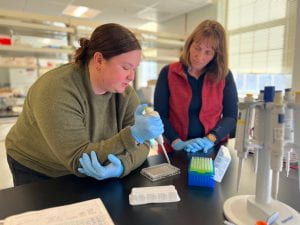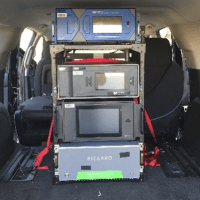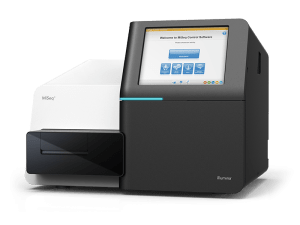 While microbiome research shows tremendous promise in advancing new discoveries and protocols in areas with a strong societal impact—climate, agriculture, food safety, animal and human health, and more—this potential can only be achieved through an integrated research enterprise that spans traditional disciplinary boundaries.
While microbiome research shows tremendous promise in advancing new discoveries and protocols in areas with a strong societal impact—climate, agriculture, food safety, animal and human health, and more—this potential can only be achieved through an integrated research enterprise that spans traditional disciplinary boundaries.
The Center of Excellence in Microbiome Sciences is in the process of developing a shared infrastructure that is suitable for the unique needs of microbiome science and scholarship. This represents a unique opportunity for disruptive and foundational scientific contributions.
The center is focused on developing an ecosystem where biologists, computer scientists, engineers, medical professionals, environmental scientists, and other experts work together to develop globally accepted laboratory analytical protocols, measurement devices, intervention strategies, and computational analytic frameworks, all within the context of real-life applications in medicine, agriculture, and environmental sciences.
The researchers hope to mimic and expand the rich intellectual environment that existed during the Human Genome Project, which led to fundamental leaps in medicine while also impacting other fields, such as agriculture and biotechnology.
Innovative Technologies
Mostafa Ghanem uses a state-of-the-art whole-genome sequencer to conduct high level research on bacteria, viruses, and pathogens. The combination of his expertise in molecular epidemiology and the sequencer’s processing power opens up a world of possibility for genomics research. Learn more.

Brantley Hall seeks to understand how to rationally modulate the human gut microbiome to improve human health. With the goal of measuring gut microbial metabolites in real-time, he is developing novel wearable devices.
 Detecting and quantifying methane emission sources in urban areas is imperative to develop methane mitigation strategies and achieve climate goals. Stephanie Yarwood is instrumental in this type of research, using a Mobile Methane and Meteorology Observation Platform (M3OP) to detect sources of pollution in the Baltimore-Washington, D.C. area.
Detecting and quantifying methane emission sources in urban areas is imperative to develop methane mitigation strategies and achieve climate goals. Stephanie Yarwood is instrumental in this type of research, using a Mobile Methane and Meteorology Observation Platform (M3OP) to detect sources of pollution in the Baltimore-Washington, D.C. area.

